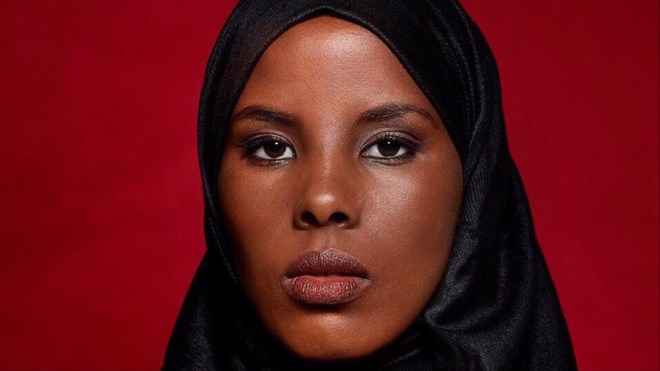Broadly
Wednesday June 27, 2018
On Tuesday, the US Supreme Court upheld Trump’s ban on travel from several Muslim-majority nations, sparking uproar from immigration activists and those directly affected by the ban, including former refugee Hamdia Ahmed.
 Photo courtesy Hamdia Ahmed.
Photo courtesy Hamdia Ahmed.
In recent weeks, Hamdia Ahmed has been thinking a lot about her experience
as a refugee. Her family escaped the civil war in Somalia in 1997 and
crossed the border to settle into a camp in Kenya. She was just a few
weeks old at the time.
“My parents had to leave everything
behind,” Ahmed, now 20, told Broadly. “You’re starting all over with
nothing but food provided by the UN and plastic shelters. It was very
difficult. My mom literally had me while she was escaping … no
medication, no hospital, nothing. People told her, ‘You’re not going to
survive. You need to leave this child and abandon her. You need to run
for your life.’ She was like, ‘No, I’m going to keep all my five kids
together.’”
Ahmed
is now a college student and aspiring model living in Portland, Maine,
who dreams of working for the UN one day. (Last year, she spoke
in front of the global organization to advocate for more education
funding for refugee children.) After spending seven years in the Kenyan
camp, her family qualified for refugee resettlement status through the
United Nations High Commissioner for Refugees, and moved to the United
States in 2005. She still has an uncle and cousins waiting to immigrate
here; her grandmother was also planning to join them, but passed away
last month.
Whether or not Ahmed will ever be reunited with her extended family, however, is now uncertain: On Tuesday, the US Supreme Court upheld President
Trump’s latest ban on travel from several Muslim-majority nations,
including Somalia. “I’m outraged,” Ahmed said about the ruling, adding,
“This isn’t [about] national security; it’s about an anti-Muslim
agenda.” In a 5-4 vote, the Court decided that the president “has lawfully
exercised the broad discretion ... to suspend the entry of aliens into
the United States.” The ban, issued as a presidential proclamation
last September, also restricts nationals from Iran, Libya, Syria,
Yemen, Venezuela, and North Korea from traveling to the US. (The nation
of Chad was originally included on that list but later removed.)
The White House has called the court’s decision a “tremendous victory,” while human rights advocates and protestors
have come out in full force against it. Nihad Awad, executive director
of the Council on American-Islamic Relations, called Tuesday’s ruling
“an invitation to inject discrimination back into our immigration
system.”
"More than half a century ago, Congress abandoned a racist immigration system that preferred some races over others,” Awad said in a statement,
referring to the country’s horrific treatment of Japanese-Americans
during World War II. “This decision is an abandonment of that milestone.
The Muslim Ban's bigotry should have been as clear to the Supreme Court
as it is to the Muslims demonized by it. Apparently, everyone but the
Supreme Court can see the decision for what it is: an expression of
animosity.”
Ryan Mace, a refugee advocate at Amnesty International USA, explained in a statement
how the travel ban will particularly impact people seeking refuge in
the US—such as Ahmed’s family. “This hateful policy is a catastrophe all
around—not only for those who simply want to travel, work, or study
here in the States, but for those seeking safety from violence as well,”
he said. “While this decision doesn’t address the separate and equally
harmful ban on refugees, it cruelly traps people in conflict-afflicted
countries and prevents them from seeking safety in the US or being
reunited with family.”
That’s one of Ahmed’s greatest concerns
now: If her uncle and cousins will ever get approval to leave the
refugee camp in Kenya—where she said “really bad things” happen—and join
the rest of their family here in the US. While the recent Supreme Court
ruling isn’t related to refugee resettlement, the ban will certainly
further delay the process. Ahmed’s family has already waited more than
10 years.
On Tuesday evening, she helped organize a #StandWithMuslims rally at Portland City Hall, where about 100 people showed up.
“I really want my family—not just my family but other families too—to
be reunited,” Ahmed said. “I see the pain that my mother goes through,
and other families when they make phone calls back home. It’s so
devastating.”
Thanks to the harmful, anti-Muslim rhetoric being
touted by the president and his supporters, Ahmed said that many travel
ban proponents believe Muslims are coming to the US to cause trouble.
“We’re not,” she said. “We’re here to be Americans and to follow the
American dream to make better lives for our family and our kids. We just
want to be a part of the American dream. If you’re denying us that
based on our religion, then that’s discrimination, and I don’t think
that’s what America stands for.”